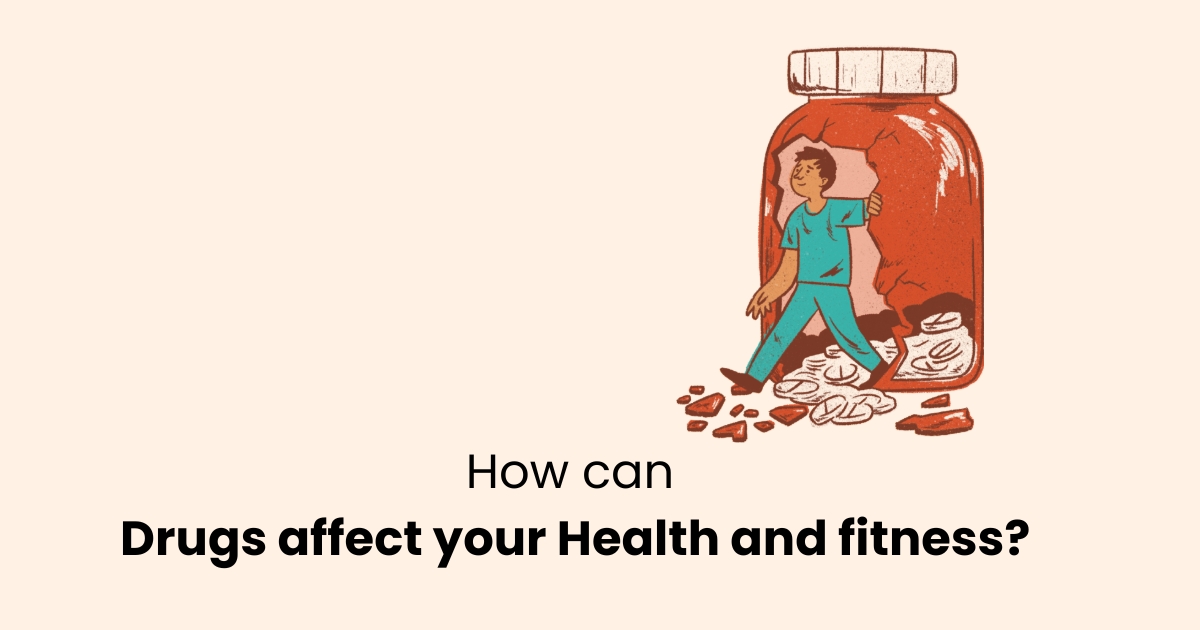Today, the talk about health and fitness has become crucial. Everyone is discovering the necessity of a balanced diet, working out and living healthier. However, one of the most crucial topics that is usually left out of these conversations is how medicines impact fitness and health. Illicit drug-taking, prescription medication misuse and even excessive consumption of legal substances such as alcohol or tobacco can have a significant impact on the health both physical and mental of an individual. This article will delve into how drugs can impact the health and fitness of an individual, in a systematic way resulting in long-term undesirable consequences.
Physical Health Consequences.
All drugs can cause substantial, and sometimes quite reversible damage to the human body. For example, stimulants such as cocaine and methamphetamine can cause a person to have an elevated heart rate and blood pressure, which could put them more at risk of having a cardiac arrest or stroke. They also caution the continued consumption of these substances may over time weaken heart muscles, leading to long-term cardiovascular disease. Opioids are another classification of medications, and they can lead to respiratory depression when breathing becomes dangerously slow it could result in death. In the longer term, they can even harm organs like the liver and kidneys which in turn leads to chronic disease that completely derails the ability to get physical help.
Drug and alcohol abuse, for example: can affect the immune system so that it is unable to resist infections or diseases. For example, injectable drug use increases the chance of acquiring blood-borne diseases such as HIV/AIDS and hepatitis. Even non-injectable drugs can impede the immune system, making everyday illnesses more likely which will hamper energy levels and general health. In addition, drugs that increase physical capacity banned substances like alcohol lead to chronic liver diseases and tobacco abuse is a major cause of lung cancer and COPD – patients with both last two gaining greatly in respect by exercise tracker.

Mental Health Implications.
Drug use has a much wider reach than just its effect on your body, it also does so to your mind. Drugs change the compounds of your brain and often time this could lead to mental health complications such as depression, anxiety, psychosis etc. A good example of this is marijuana, which despite being commonly accepted as fairly benign can impair cognition and motivation with chronic use that persists long after quitting. Hallucinogens such as LSD can affect mood for up to two weeks, resulting in severe mood swings while paranoia and schizophrenia symptoms may get triggered in individuals predisposed to the disorder.
Moreover, addiction is a mental health disorder as well that dictates life so strongly often the person stops exercising and caring about his own body due to this loss of activity ∈ pleasure. A persistent obsession with obtaining and abusing drugs results in social disengagement, quitting different activities, unsuitable relationships, or a general breakdown in mental stability. Addiction can be emotionally draining leading to high levels of anxiety and depression, Creating further difficulty in fostering stable health practices.
Impact on Fitness Levels.
Drugs and fitness are two diametrically opposed entities. It can also be a bit of waste to work on your fitness level when you are able-bodied but then use drugs that can reduce physical strength, flexibility and endurance. For instance, anabolic steroids have been used as a means to expedite muscle growth but can result in side effects such as heart disease and liver damage or lead to hormonal imbalances that actually degrade physical performance. Secondly, stimulants like cocaine or amphetamines can give you a temporary energy lift followed by an abrupt crash that produces chronic fatigue and muscle atrophy after continued use.
Weed and toxins, including tobacco smoke: particular dangers for the respiratory system In case your lungs are damaged and yearning, they cannot deliver oxygen efficiently to the muscles for exercise leading to limits in stamina endurance. Even physical activities that are as basic to weight loss as jogging or swimming may be difficult and leave you feeling very fatigued. Over and above anything else, alcohol – a depressant – slows reaction times and reduces coordination levels which is essential for good physical performance. Alcohol abuse causes weight gain, muscle atrophy and overall a decline in fitness.
Nutrition and Drug Use.
Good nutrition is crucial for keeping fit and healthy; while drug users too often eat badly This results in malnutrition and weight loss through many drugs that disappear the feeling of hunger. For example, people who use methamphetamine often lose weight rapidly because they may go for days without eating. An additional downside, alcohol also has calories and these are only empty ones that contribute to weight gain – while missing essential nutrients such as vitamins or minerals.
The lack of important nutrients in a body, which we will talk about later, can easily lead to its weakening and it is also more prone to injury or incapable of recovery after heavy lifting. Along those lines, inadequate nutrition can result in muscle wasting, lower energy levels and an impaired immune system deficient in functionality for participating at peak capacity fitness-wise. Not keeping in mind these dimensions of healthy living will create a vicious loop between drug use and malnutrition, the loss of physical health creating an open door for more drugs to deal with life further worsening this destructive process.
Long-Term Health Risks.
The long-term health effects of drug use can be severe, and broad-ranging and may even result in permanent damage. Drug addiction can contribute to the occurrence of heart disease, cancer and respiratory diseases. Instead, these states will lead to less enjoyment of life and also a shorter span. Long-term alcohol consumption, for instance, can lead to liver cirrhosis where healthy liver tissue is replaced with scar tissue resulting in the failure of this organ. Likewise, cigarettes are the single greatest cause of lung cancer, a frequently lethal disease.
ExistentialAnd as if that was not bad enough, long-term drug use may further result in cognitive impairment which could remain irreversible. Brain cell destruction due to a variety of drugs, causes the neural track that is responsible for memory scarring and cognition functioning with a lack in judgements. Cognitive deficits such as these can make it difficult to live a healthy lifestyle and may affect your ability to stick with an exercise routine or even eat well.
Impact of Social and Economic.
Drug use comes with more than just direct health effects, it can have huge social and economic impacts which feed into the health of an individual. Financial hardship to pay for drugs can result in poverty, homelessness and a lack of healthcare Individuals who become sick are less likely to seek care for addiction, mental health or other chronic illnesses and therefore must go without necessary treatment that could prevent their condition from worsening.
Drug use can also result in criminal legal trouble-inducing arrests and incarcerations- that may interfere with an individual’s life options, as it restricts them from employment opportunities or participation in any education/social circles. The mental health of a person might be affected more due to the legal outcomes and stigmatization related to drug abuse that will hold back an individual from seeking help.

Recovery and Rehabilitation.
While drug use carries devastating and potentially deadly repercussions, recovery from addiction is achievable with the right help and care. A combined physical and mental health program will help any addict overcome the addiction barrier and get back into a fit trickle. Typical programmes include medical detox, therapy, counselling or support groups to equip an individual to live a drug-free life.
Recovery is also dependent on physical activity and proper nutrition. It also helps regain strength, stamina and flexibility so that functioning fully can be much less of a struggle; as well as having an impact on mental health bringing some reduction in stress and halting anxiety. such as a healthy and balanced diet may help to replenish the body of specific nutrients required in immune function, hence restoring health. Living a healthy lifestyle for people who have become sober will be beneficial on both a physical level and psychological, but also in terms of the overall quality of life.
Conclusion
Finally, the most basic overall effect of being healthier due to drugs is death! Physical consequences encompass chronic illnesses, weakened immune systems and impaired physical performance; the mental health effects include addiction, depression and anxiety. Moreover, drug use commonly results in low nutrition and lifestyle selections that continue to compete with one’s well-being. But with the appropriate help and treatment, people can gain better health and regain their physical fitness level by living a prescription-free life.
Awareness about the harm caused by drug use, and promoting a healthy lifestyle can help them to make informed choices thereby keeping themselves safe.

